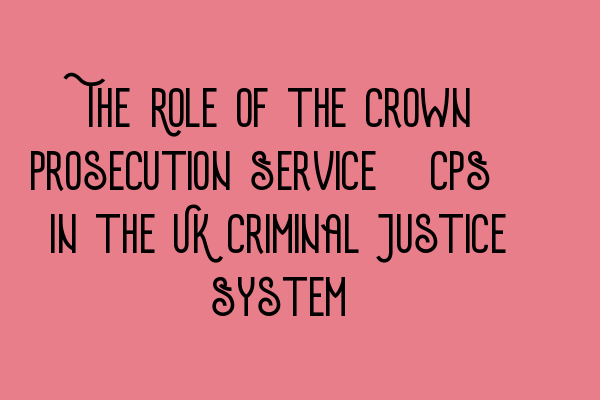The Role of the Crown Prosecution Service (CPS) in the UK Criminal Justice System
Welcome to SQE Criminal Law & Practice Law UK! In this blog post, we will discuss the essential role of the Crown Prosecution Service (CPS) in the UK criminal justice system. The CPS plays a crucial part in upholding justice and ensuring fair trials for all individuals involved. Let’s dive in!
What is the Crown Prosecution Service (CPS)?
The Crown Prosecution Service (CPS) is an independent authority responsible for prosecuting criminal cases in England and Wales. It operates under a code of practice and ensures that the criminal justice system functions effectively.
The CPS works closely with the police, courts, and other agencies to make informed decisions regarding the prosecution of criminal cases. They consider the evidence and public interest to determine whether or not to proceed with a case. Their primary goal is to bring offenders to justice through fair and effective prosecution.
Role of the CPS
The CPS has several crucial functions within the criminal justice system:
- Case Preparation: The CPS scrutinizes the evidence provided by the police and other investigative agencies. They assess the strength of the case and advise the police on further investigations if necessary. Proper case preparation is vital to ensure that all relevant evidence is presented in court.
- Decision-Making: Based on the evidence and public interest, the CPS determines whether a case should proceed to trial or not. They consider factors such as the seriousness of the offense, the credibility of the evidence, and the potential impact on victims and witnesses.
- Advocacy: The CPS represents the prosecution at court hearings. Their skilled advocates present the case before judges and juries, ensuring that all relevant evidence is properly presented and argued.
- Victim Support: The CPS recognizes the rights of victims and witnesses, providing assistance and support throughout the legal process. They work to minimize any additional trauma and ensure that victims are treated with compassion and respect.
- Professional Standards: The CPS maintains high professional standards within its workforce. They provide training and guidance to prosecutors, ensuring they adhere to legal and ethical standards while carrying out their duties. Continuous professional development is crucial to keeping up with changes in law and legal practice.
Benefits of the CPS
The CPS plays a critical role in promoting justice and maintaining public confidence in the criminal justice system. Some key benefits include:
- Fair Trials: The CPS ensures that defendants are prosecuted fairly, providing a robust and balanced presentation of the evidence before the courts. This promotes the right to a fair trial.
- Public Accountability: The CPS operates independently and is accountable to the public. Prosecution decisions are made transparently and based on factors such as evidence, law, and the public interest.
- Effective Prosecutions: The CPS’s expertise in case preparation, decision-making, and advocacy leads to effective prosecutions. This reduces the likelihood of wrongful acquittals and ensures that guilty individuals are held accountable for their actions.
- Victim and Witness Support: The CPS recognizes the importance of supporting victims and witnesses throughout the legal process. Their assistance helps in reducing trauma and encourages effective participation in the criminal justice system.
For more information about legal qualifications, including practicing criminal law and preparing for the SQE exams, we recommend checking out our related articles:
- SQE 1 Practice Exam Questions
- SQE 1 Practice Mocks FLK1 FLK2
- SQE 2 Preparation Courses
- SQE 1 Preparation Courses
- SRA SQE Exam Dates
We hope you found this blog post informative about the Crown Prosecution Service (CPS) and its role in the UK criminal justice system. If you have any further questions or would like to explore legal qualifications and practice areas, please don’t hesitate to contact us.
Disclaimer: This blog post is intended for informational purposes only and should not be construed as legal advice. Consult with a qualified solicitor for professional guidance.
